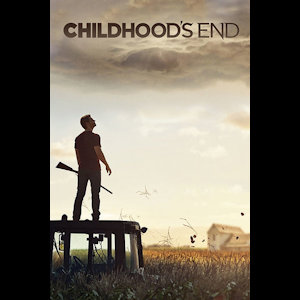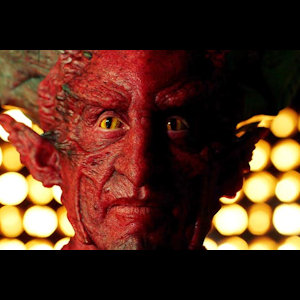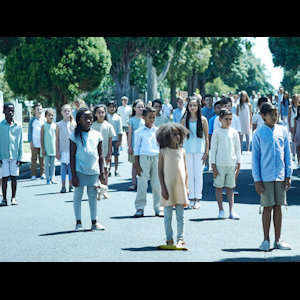The Summer of Arthur C. Clarke: Childhood's End (TV)
Before I begin, welcome to my Summer of Arthur C. Clarke. On the heels of last year's popular Slasher Summer, this year I'm leaving behind the guilty pleasure of the niche horror genre and exploring something a little closer to my own heart: namely science-fiction. Of all the sci-fi greats, none have influenced me more than the late Arthur C. Clarke, my personal favorite of the "Big Three" from the Golden Age of the genre (Asimov, Clarke, and Heinlein). This summer, I am going to look at a few of his most famous works, including the entirety of his 2001 series and the tiny handful of adaptations that have been made for film, television, and video games. Strap in and prepare yourselves for a journey into the stars and the mind, and let us never forget how much richer the world of fiction is for having been blessed by the incomparable Sir Arthur C. Clarke.
 | | There's a lot more depth to this image that it first seems |
Since the 1960's, there have been various attempts to adapt Childhood's End to the screen, and in late 2015, the Syfy Channel finally succeeded by airing a three-part miniseries starring Mike Vogel and Charles Dance. Though the adaptation makes several narrative and cosmetic changes to the source material, it remains remarkably faithful to Clarke's original vision, for better and for worse.
The novel is unweildy as source material, with large time jumps and a revolving door of protagonists with no connection to each other. The miniseries tackles these challenges fairly well by condensing the timeline to a few decades (not counting Milo's final journey) and having the characters more interrelated. This certainly makes for a better television series and a more cohesive plot, but it also makes the grand plot beats--already difficult to swallow in the novel--even harder to accept given an accelerated period of time for things like religion, science, conflict, and art to come to an accepted end by humanity at large. Also, intermixing all these characters, albeit tangentially, presents an element of narrative convenience that isn't present in Clarke's book.
However, while the characters are all improvements upon Clarke's blank slate creations, there still isn't a central protagonist. Instead, there are three competing sets of couples: Ricky and Ellie (Mike Vogel and Daisy Betts), Milo and Rachel (Osy Ikhile and Charlotte Nicdao), and Jake and Amy (Ashley Zukerman and Hayley Magnus). Ricky is the one who spends time with the Overlord Karellen before he reveals his true face to the world, but instead of dropping out of the narrative after this point, he and his wife, Ellie, continue to have narrative relevance through storylines not present in the novel. Similarly, Milo, the scientist who ultimately stows away aboard an Overlord vessel in the final parts of the story, is given a backstory that plays out from the very beginning, along with a love interest that becomes deeply problematic in the final episode. Jake and Amy, the parents of the all-important Jennifer, don't get quite as much attention in the first episode, though their backstories as children was filmed before ending up on the cutting room floor.
 | | Charles Dance steals the whole show as Karellan |
Each of these three narratives is compelling in its own right, and having them play out roughly simultaneously makes the story gel in positive ways. The strongest benefit comes when all three stories come to a close at roughly the same time, giving the climax much more poignancy. While the lives of our heroes do mix in different ways, the thing that really binds them together, of course, is Karellen, played brilliantly by Charles Dance. Most of the acting for the protagonists is acceptable--even good in places--but Dance is by far the best actor in the series, playing Karellen with intellectual aplomb and thickly veiled emotion.
Unfortunately, the big drawback comes in the form of the poorly-realized antagonists, like the black-suited Hugo Wainwright (Colm Meaney, in his most mustache-twirling role to date), the cartoonishly zealous Peretta Jones (Yael Stone), the bizarrely inept corporatist Rupert Boyce (Julian McMahon), and the borderline anarchist mayor with an atomic bomb in his basement, Jerry Hallcross (Tanc Sade). These characters are all horribly one-dimensional and aren't given nearly enough time to develop, despite a wealth of potential motivation. If these characters were given as much attention as the heroes, they would have felt more real and morally ambiguous, giving the plot more depth. Alternatively, a few of them could have been combined (for example, Wainwright and Hallcross could easily have been written as one person), giving them space to develop alongside the protagonists.
The plot makes a wise decision not to shy away from Clarke's religious skepticism while simultaneously downplaying the more pseudoscientific psychic phenomena. It isn't afraid to be bold in asking difficult, upsetting questions, and that makes it feel intellectually genuine. Also, reimagining the ouija board scene from the book--while the scene is still a bit silly in the series--is a clever bit of scriptwriting.
 | | There's a very fine line between creepy and stupid |
The final episode then manages to carry a lot of weight without feeling unearned. While it glosses over some of the novel's explanations, it emphasizes the disturbing qualities of the ending, not trying to shoehorn-in any unearned platitudes or happy wrapping-up. This is where any adaptation could easily have failed, but I give the Syfy Channel and the miniseries producers a lot of credit for not meddling with such a necessarily unsettling conclusion. That said, the scenes of the children rising up to the sky comes across as almost laughably hokey.
As a Syfy Channel production, some budgetary cracks are inevitable. While many visual and special effects are great, such as the Overlord ship exteriors and Karellen's make-up work, some are downright terrible. Also, while most of the sets don't look cheaply made, the cinematography is filled to the brim with tight-focus close-ups that hide most of them from view, with many scenes outright refusing to show any wide-angle medium shots. This makes for a claustrophobic, unnatural feel that goes against the tone and mood of most scenes. Where the set designs go completely off the rails is near the end, when we finally get a glimpse of the Overlord ships' interiors, which are basically just barren warehouses made out of 90% last minute CGI.
Despite its shortcomings, though, the Childhood's End miniseries is a lovingly realized recreation of Clarke's novel. It fleshes out the central characters well, makes several welcome additions, condenses the clunky timeline, has decent acting talent and cool ambient music, nails the ending, and is true to the source material in all the right ways. The antogonists are weak, the pacing is uneven, and many of the broader plot beats are too fantastical to suspend disbelief, so it's probably not great television for casual viewers and might be a bit much for anyone unfamiliar with the novel. Still, it's intelligent science-fiction done pretty well, and we could always use more of that.
-e. magill 5/17/2018
THE UNAPOLOGETIC GEEK'S
SUMMER OF ARTHUR C. CLARKE: | |
|
|
|